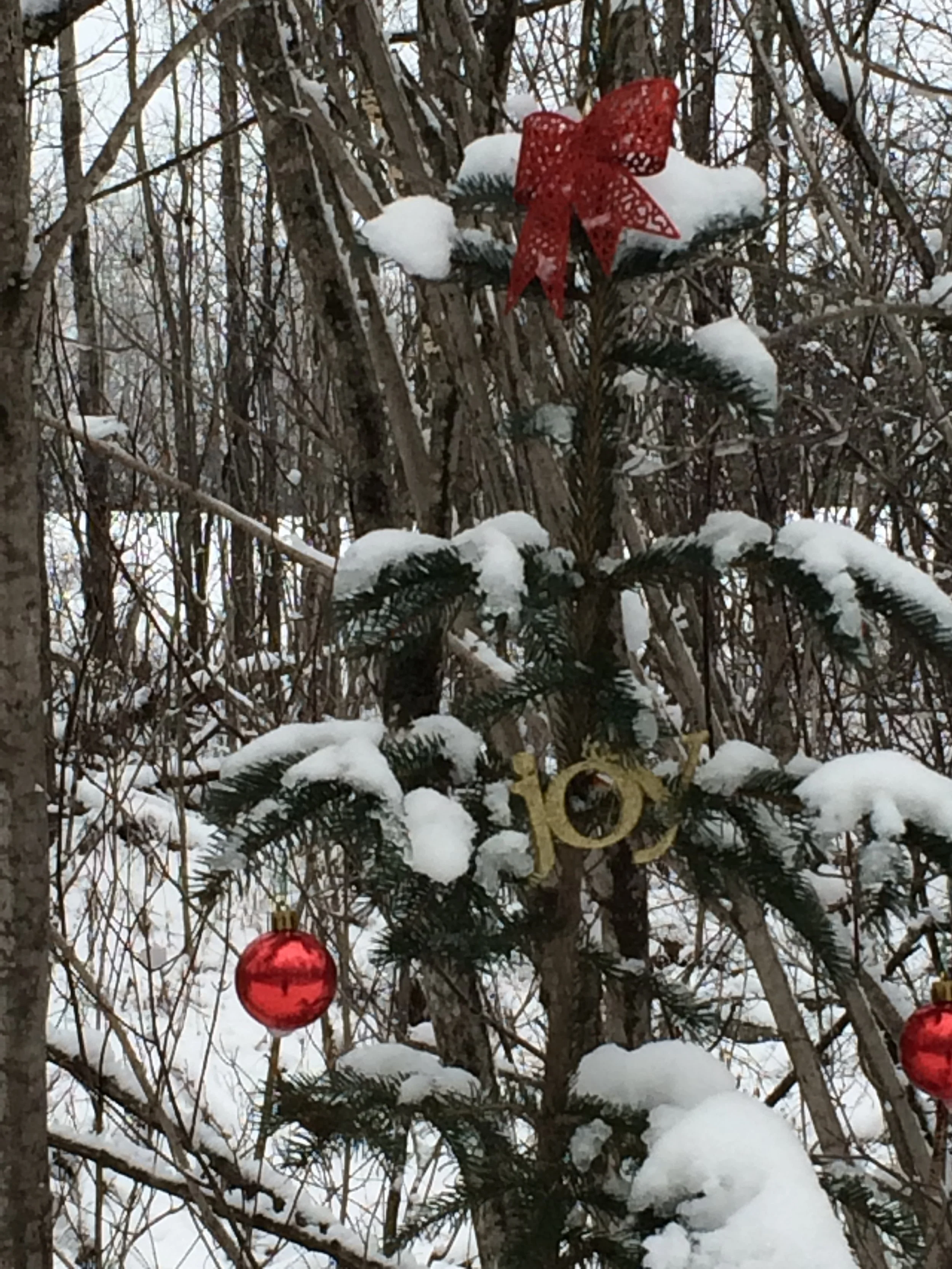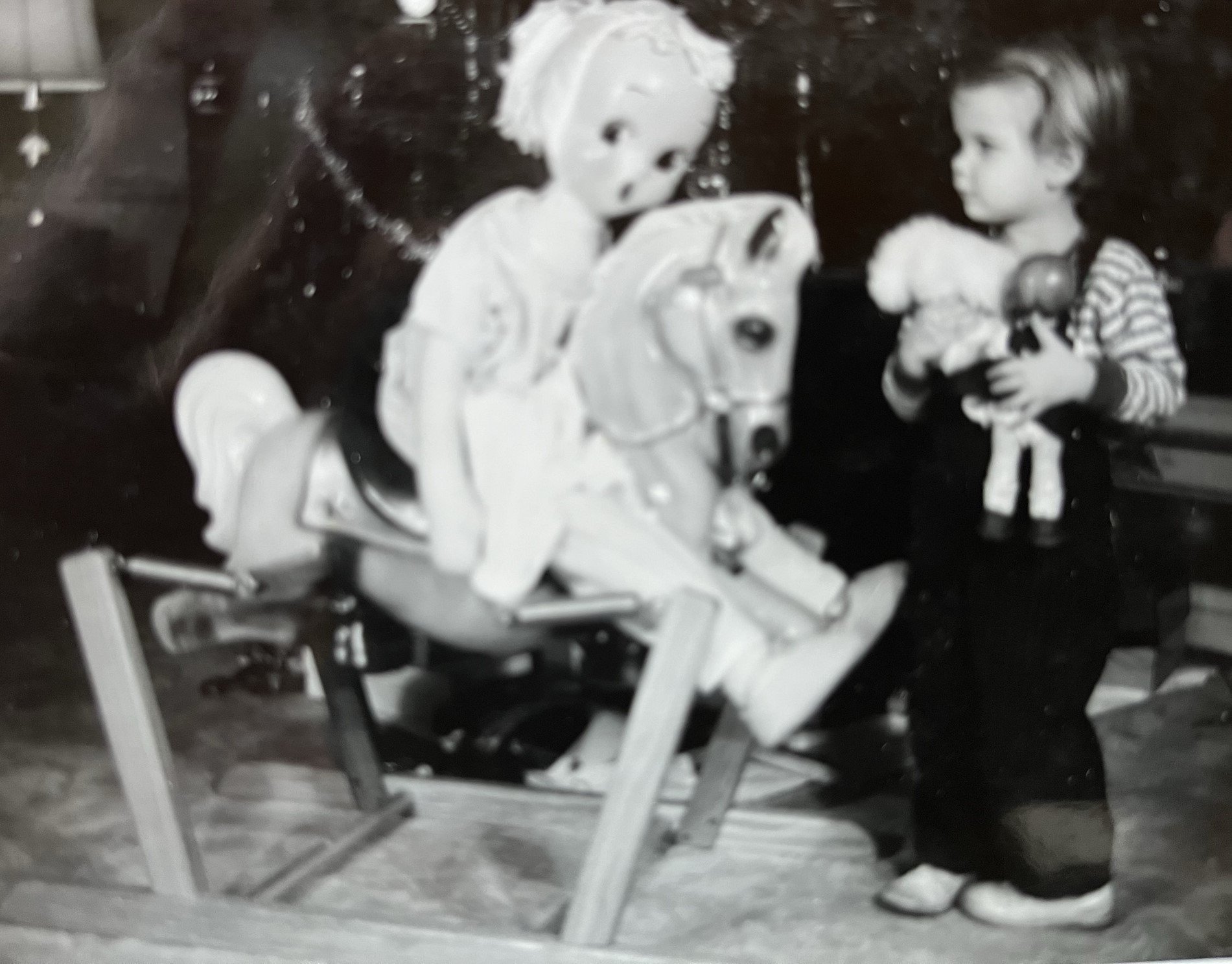♪ Joy to the world . .. ♪-- undoubtedly my mother’s favorite Christmas carol, its jubilant strains marked the official beginning of Christmas when I was a child. On Christmas mornings my brother, sister, and I weren’t allowed to come downstairs from our bedrooms until we heard the music playing. I was the last of four, and I suppose after more than a dozen years of arising during the pre-dawn hours to children excitedly wanting to open presents, my mom had had enough. However, we would each awake to find a present at the bottom of our beds, and that was enough to placate us until we heard the music. And then, at last, the trumpets and voices singing, “Joy to the world!” beckoned us down to the living room, with presents piled high under the brightly lit Christmas tree and stockings filled to the brim hung by the roaring fire. The recordings my dad surreptitiously made with his new reel-to-reel tape recorder are filled with screams and shouts of joy as we tore off wrapping paper and ribbons to discover the hoped-for toy. I can still hear my brother, Bruce, at the age of six, when he saw the longed-for rocking horse waiting for him in front of the Christmas tree, screaming “Trigger! Trigger! I got Trigger for my horsie!”
Trigger
It was not until several years later, when I was first given the money and the freedom to roam the downtown department store so I could pick out gifts for others that I discovered another greater joy – the joy of giving. There would be the usual embroidered handkerchiefs for my grandmother, and the standard clip-on tie for my dad, but for some reason what I remember most was the year I first thought of a gift for my mom on my own and bought her a new set of steak knives. It was something she had wanted, and I was so excited to watch her open it. After I learned how to knit, I would have the anticipatory joy all the while I was making gifts of hats and socks, scarves and mittens, sweaters and blankets. This later expanded to baked goods, photo albums and mugs, the written word, and lovingly crafted treasure hunts. These gifts of heart and hand were the most joyous of all.
Yet, somewhere in all the giving and receiving of gifts we appear to have lost the joy of Christmas itself. In recent decades, the purchasing of presents has seemed to become the “reason for the season.” It has even spawned its own named holidays – “Black Friday,” “Super Saturday.” Recently on the evening news, the anchor reported the “good news” that 2022 has surpassed all previous years in the amount of spending people in the US are doing in this “Christmas shopping season.” Has this become the “good news” of Christmas? Are these the glad tidings of great joy foretold by the angels? The commercialization and commodification of Christmas have depotentiated the joy – putting the focus instead on consumption, spending, feeding the capitalist machine, making even Scrooge in his counting house smile.
But the joy of Christmas is far more radical. As a child, I experienced Christmas as a most magical and wonderful time of year, and it wasn’t just about getting presents. Strangers greeted each other with good cheer, wishing each other a “Merry Christmas.” Children visited the homes of the elderly and housebound, brought them cookies and sang carols. People were different – kinder, friendlier, more open-hearted, more forgiving. These are the true gifts invoked by the Christmas season, and as a child I often wondered why we couldn’t continue these all year. I still do.
It is the question posed by the story of the Christmas truce, when during World War I, the German and British soldiers for a brief time silenced their guns, cannons, and enmity, crossed into no-man’s land, and shared some Christmas cheer.[i] How could they in one moment share a bit of chocolate and brandy, stories of loved ones at home, play a game of soccer, and sing Christmas carols together – and in the next, shoot and kill each other? Why couldn’t the friendship and good will continue into the next day and the next and the next? It begs the question, how would the world of those who profit from war and oppression stay in power if the joy invoked by Christmas continued all year? This is the deeply radicalizing potential of Christmas – of finding our deepest connections, of knowing the joy of which we are capable, of which the world is capable.
A few weeks ago, I went to visit a dear friend and former college professor of mine. Garry developed Parkinson’s several years ago, and as he has increasingly lost physical capacities, he has adopted the practice of concluding each day by noting the joys he has experienced that day. The practice helps to sustain in him the kindness and generosity of spirit that I have always known him to exude, even in the midst of the sorrows of loss. Always the teacher and scholar, he introduced me to the work of poet Ross Gay, and his latest book, Inciting Joy. In his book, Gay sets about to explore the habits and rituals that make joy more available to us, and certainly Garry’s practice is one of those.
What, Gay asks, “incites joy?” As he illustrates throughout his volume, joy is readily available to us all, all the time – whether in a gardener sharing her vegetables, or neighborhood kids enjoying a game of pick-up basketball, or in precious moments of caring for a loved one in their dying. He goes so far as to suggest that joy may be fundamentally “tangled up” with pain and sorrow, that “joy emerges from how we care for each other through those things” (3). Indeed, one of my greatest moments of joy in the past year was after a huge snowstorm when my neighbor, who was plunged through with grief over the sudden and unexpected death of her husband, and I got out the snow tube and raucously slid and spun down the driveway, laughing all the way. Witnessing her joy amidst her sorrow brought greater joy to my heart than the glorious ride itself. What incites your joy? It is a question we would all benefit from exploring.
But it is Gay’s second question – what does joy incite? – that is the more provocative. Incite – to provoke, stir up, arouse – as in, to incite revolution. Gay answers his own question: “My hunch is that joy is an ember for or precursor to wild and unpredictable and transgressive and unboundaried solidarity. . . . My hunch is that joy, emerging from our common sorrow – might draw us together. It might depolarize us and de-atomize us enough that we can consider what, in common, we love. . . .” (9). Audre Lorde similarly wrote, “The sharing of joy . . . forms a bridge between the sharers which can be the basis for understanding much of what is not shared between them, and lessens the threat of their difference.” (56) Consider for a moment the creative potential, or as Gay says, the “transgressive” possibilities this lessening the threat of difference between us, the depolarization of us, the love between us could bring? It could up-end the power of those who profit from this polarization and enmity, inviting the subversive possibilities of the “unboundaried solidarity” of being on each other’s side vis à vis the capitalist patriarchy, creating just and right relations with each other and the earth. Joy incites an uprising of the heart.
In an interview on CNN, Gay related that as he had become more aware of the ways that institutions and structures have been designed to “enforce destitution,” his questioning of that brought him to recognize the potential of radical joy to counter these systems. As Lorde wrote: “That deep and irreplaceable knowledge of my capacity for joy comes to demand from all of my life that it be lived within that knowledge that such satisfaction is possible. . . . Once we begin to feel deeply all the aspects of our lives, we begin to demand from ourselves and from our life-pursuits that they feel in accordance with that joy which we know ourselves to be capable of” (57). Such joy could empower us to demand of our relationships, our work, our worship, our institutions, and our lives, that they be fulfilling of our deepest purposes, soul-enhancing avenues of self-expression, self-determination, and meaning.[i] Joy incites transformational change.
“…One must keep a freshness and source of joy intact,” wrote Albert Camus. How often have I referenced this passage? Yet, I have usually focused on the part of the sentence I quoted here. But what grabs my attention now is the first part of the sentence -- “In order for justice not to shrivel up . . .” (168). Joy is essential for the preservation of justice. Is this not, after all, what the glad tidings of Christmas are about – the restoration of justice into a world out of balance and beleaguered by domination; the bringing of love, equity, and mercy to the oppressed; the busting up of hierarchies and the recognition of the divinity in all beings – even a babe born in the humblest of circumstances. Joy incites justice, and justice incites joy. Joy to the world, indeed!
♪And heaven and nature sing!♪
Sources
Camus, Albert. 1970. Lyrical and Critical Essays. Ed. and with Notes by Philip Thody. Trans. Ellen Conroy Kennedy. NY: Vintage-Knopf.
Gay, Ross. 2022. Inciting Joy: Essays. Chapel Hill: Algonquin Books.
Lorde, Audre. 1984. Sister Outsider: Essays & Speeches by Audre Lorde. Trumansburg: New York, The Crossing Press.
Poet Ross Gay on his new book, 'Inciting Joy' - CNN Style
Watts, Isaac. 1719. “Joy to the World” in The Psalms of David: Imitated in the Language of the New Testament, and applied to the Christian state and worship.
Young, Iris Marion. 1990. Justice and the Politics of Difference. Princeton: Princeton U. Press.
[i] This story was beautifully set to music by John McCutcheon, “Christmas in the Trenches.”
[ii] In thinking about this, I am indebted to Iris Marion Young for her brilliant analysis of oppression and domination, especially in the workplace, in her Justice and the Politics of Difference.


